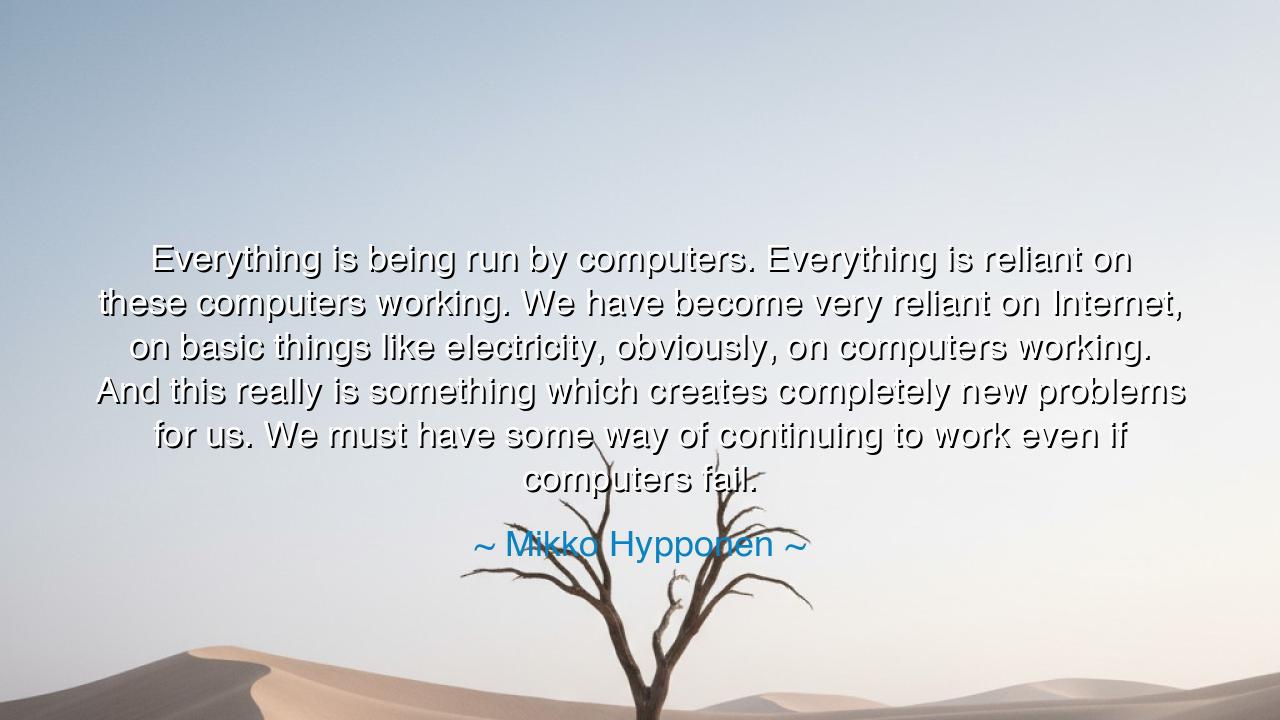
Everything is being run by computers. Everything is reliant on
Everything is being run by computers. Everything is reliant on these computers working. We have become very reliant on Internet, on basic things like electricity, obviously, on computers working. And this really is something which creates completely new problems for us. We must have some way of continuing to work even if computers fail.






In the age of invisible currents and silent intelligence, when thought itself travels faster than wind, Mikko Hyppönen, the great guardian of the digital realm, spoke these words of sober warning: “Everything is being run by computers. Everything is reliant on these computers working. We have become very reliant on Internet, on basic things like electricity, obviously, on computers working. And this really is something which creates completely new problems for us. We must have some way of continuing to work even if computers fail.” Though spoken in the language of modernity, his words carry the weight of ancient prophecy — a reminder that every tower built by human hands, no matter how tall or gleaming, must one day face the test of its own foundation.
Hyppönen, a pioneer in cybersecurity and a scholar of digital threats, has spent his life studying the power and peril of technology. He is no enemy of progress — rather, he is its watchful steward. From his work defending nations and individuals against the unseen forces of the Internet, he learned that the very systems that unite us also make us vulnerable. The computer, that marvel of human intellect, has become both the engine and the Achilles’ heel of civilization. We depend upon it not only for communication and commerce, but for medicine, transportation, energy, and governance itself. His warning is clear: the more we entrust to the machine, the more fragile we become when it fails.
Imagine, as Hyppönen has, a world silenced by the failure of its own creations. The Internet blinks out; electricity falters; computers freeze. Planes grounded, hospitals blind, cities without power — even the beating heart of modern life, the flow of information, comes to a stop. This is not a myth, but a possibility. We have built a civilization that runs upon invisible code, yet few can remember how to live without it. Our ancestors could light fires, navigate by stars, farm by hand. We, who command satellites and supercomputers, may not even know how to open a door when the system fails to recognize our face. Thus, Hyppönen’s words are not born of fear, but of wisdom — the recognition that dependence without preparation is a silent form of surrender.
History offers its echoes. In the year 1859, a great storm raged upon the sun — a solar flare so powerful that it set telegraph wires aflame across the Earth. The Carrington Event, as it was later called, crippled the communication network of the 19th century. Then, the world recovered, for it still remembered how to function without machines. But imagine such an event striking today. Our satellites would burn, our grids would fail, and our world — built upon the fragile web of electricity and computation — would plunge into chaos. Hyppönen’s voice, then, is the voice of foresight: he urges us to remember what we once knew, to guard not only our networks, but our resilience.
His words also bear a spiritual truth. The ancients, too, faced the temptation of overreliance — though their idols were not computers, but empires, armies, and gold. They learned, through ruin and rebirth, that what is external cannot be the sole source of strength. The Stoics taught that the wise man must be self-contained, able to endure when fortune’s gifts are stripped away. So too must our modern civilization learn this discipline — to stand upright when the machines fall silent. The true measure of advancement is not how much power we have gained, but how well we endure its absence.
Therefore, Hyppönen’s warning must be taken as both practical and philosophical. On one hand, he calls for preparedness: systems that can operate offline, backups that outlive the network, knowledge that does not vanish when the screen goes dark. On the other, he speaks to the human condition — that we must not let our tools become our masters. To rely too deeply upon the machine is to let our memory and imagination atrophy. Just as muscles weaken when unused, so too does the mind falter when it no longer needs to remember, adapt, or survive without assistance.
So, my listener, take heed of this wisdom. Live not in rejection of technology, but in balance with it. Learn to store knowledge not only in the cloud, but in the mind and the hands. Keep candles where there is light, books where there are screens, and skills where there are shortcuts. Let not the hum of computers lull you into forgetting the silence of the world they replaced. For Hyppönen’s message is eternal: that strength lies not in dependence, but in resilience; that progress without foresight is a fragile illusion. And when the day comes that the machines falter — as all things built by men eventually do — may we stand ready, not as victims of failure, but as masters once more of our own ingenuity.
For the greatest wisdom of Mikko Hyppönen’s words is this: that true security does not come from code or circuitry, but from the eternal capacities of the human spirit — its creativity, adaptability, and courage. Let us remember, then, that while computers may guide our hands, it is still the heart that must guide the world.






AAdministratorAdministrator
Welcome, honored guests. Please leave a comment, we will respond soon